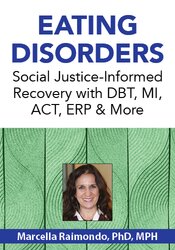

Eating disorders can be so tough to spot.
You might think, “I’ve never had a client with an eating disorder.”
But here’s the truth – you’ll likely have clients with eating disorders in your caseload at some point, whether you recognize it or not.
Unfortunately, because graduate programs and clinical placements offer limited if any training on eating disorders, too few clinicians are prepared to help, and too many clients go untreated.
And with a cascade of potential psychological comorbidities and medical complications – plus a worsening trajectory the longer the eating disorder operates – the stakes are high.
Now you can get the skills, tools, and confidence you need to identify and safely work with clients with eating disorders right away – without needing to be a specialist. Watch eating disorder expert Marcella Raimondo, PhD, MPA – whose lived experience with anorexia informs her approach – in this essential training that pays attention to what so many others miss – the social justice component of eating disorders treatment.
Whether you knew from the start about their eating disorder, or were deep in your work before your client trusted you enough to share their symptoms, you’ll learn:
PURCHASE TODAY so you can help your clients take back control of their lives!
Continuing education credit information is coming soon for this non-interactive self-study package.
CEs may be available for select professions, as listed in the target audience. Hours will be dependent on the actual recording time. Please check with your state licensing board or organization for specific requirements.
There may be an additional fee for CE certificates. Please contact our Customer Service at 1-800-844-8260 for more details.
**Materials that are included in this course may include interventions and modalities that are beyond the authorized practice of your profession. As a licensed professional, you are responsible for reviewing the scope of practice, including activities that are defined in law as beyond the boundaries of practice in accordance with and in compliance with your professions standards.

Marcella Raimondo, PhD, MPH, is a passionate and spirited clinical trainer speaking from her heart on social justice and eating disorders since 1995. Herself recovered from anorexia, she has held a variety of prominent positions in eating disorders-focused organizations, including past president and current advisory board member of Eating Disorder Recovery Support (EDRS); former co-chair of the Academy of Eating Disorders (AED) diversity, equity, and inclusion committee; advisory board member for Arise, a telehealth-based eating disorders care network; former advisory board member for the Association of Size Health and Diversity (ASDAH); and consultant, board of founders member, and former director of media literacy for About-Face, a nonprofit organization that addresses media impact on body image. Dr. Raimondo has worked in eating disorders outpatient and residential programs. She is currently a psychologist in Kaiser Permanente’s eating disorder clinic in Oakland and owner of a private practice. Dr. Raimondo holds a second-degree black belt in Kajukenbo in support of her dedication to multicultural body nurturance. For more information, go to marcellaedtraining.com.
Speaker Disclosures:
Financial: Dr. Marcella Raimondo maintains a private practice and has an employment relationship with Kaiser Permanente Oakland Medical Center Eating Disorders Clinic. She is a consultant for Ride the Wave Therapy Clinic. She receives a speaking honorarium and recording royalties from PESI, Inc. She has no relevant financial relationships with ineligible organizations.
Non-financial: Dr. Marcella Raimondo serves on committees for the Academy of Eating Disorders and Eating Disorders Recovery & Support. She serves on the advisory board for the Association of Size Diversity and Health. She is a member of the American Psychological Association and the California Psychological Association.
Access never expires for this product.
Visit our FAQ page at www.pesi.com/faq or contact us at www.pesi.com/info
Satisfaction Guarantee
Your satisfaction is our goal and our guarantee. Concerns should be addressed to: PO Box 1000, Eau Claire, WI 54702-1000 or call 1-800-844-8260.
ADA Needs
We would be happy to accommodate your ADA needs; please call our Customer Service Department for more information at 1-800-844-8260.
PESI Mobile App
Access CE trainings on your phone or tablet through our free mobile app. Choose video or audio-only versions of online courses from the world’s best instructors, and complete your CE requirements anywhere, anytime, at your own pace.
Please wait ...